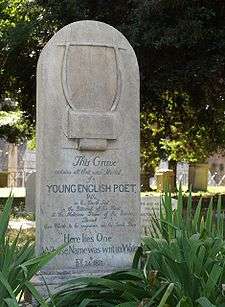1821 in literature
This article presents lists of the literary events and publications in 1821.
| |||
|---|---|---|---|
|
Events
- August 4 – Atkinson & Alexander publish The Saturday Evening Post for the first time as a weekly newspaper in the United States.
- James Ballantyne begins publishing his Novelist's Library in Edinburgh edited by Sir Walter Scott.[1]
- Percy Bysshe Shelley's Queen Mab: a philosophical poem (1813) is distributed by an unauthorized publisher in London leading to prosecution by the Society for the Prevention of Vice.
- In the first known obscenity case in the United States, a Massachusetts court outlaws the John Cleland novel Fanny Hill (1748). The publisher, Peter Holmes, is convicted for printing a "lewd and obscene" novel.
- At about this date Sunthorn Phu is imprisoned and begins his epic poem Phra Aphai Mani.
New books
Fiction
- James Fenimore Cooper – The Spy
- Pierce Egan – Life in London; Boxiana Vol. III
- John Galt
- Annals of the Parish
- The Ayrshire Legatees
- Johann Wolfgang von Goethe – Wilhelm Meister's Journeyman Years (Wilhelm Meisters Wanderjahre)
- Ann Hatton – Lovers and Friends
- Hannah Maria Jones – Gretna Green
- Charles Nodier – Smarra
- Anna Maria Porter – The Village of Mariendorpt
- Jane Porter – The Scottish Chiefs
- Sir Walter Scott – Kenilworth
Children
- Maria Hack – Harry Beaufoy; or the Pupil of Nature
- Thomas Love Peacock – Maid Marian
Drama
- Lord Byron
- Marino Faliero, Doge of Venice (published & performed)
- Sardanapalus: a tragedy; The Two Foscari: a tragedy; Cain: a mystery (published together)
- Alexandre-Vincent Pineux Duval – Le Faux Bonhomme
- Aleksander Fredro – Pan Geldhab (Mr. Gelhab)
- Franz Grillparzer – Das goldene Vliess (The Golden Fleece trilogy)
- Heinrich von Kleist (died 1811) – The Prince of Homburg (Prinz Friedrich von Homburg oder die Schlacht bei Fehrbellin, first performance, in abridged version as Die Schlacht von Fehrbellin; completed 1810)
Poetry
- Heinrich Heine – Poems
- Alessandro Manzoni – Il Cinque Maggio (May 5th)
- Percy Bysshe Shelley – Adonaïs
Non-fiction
- James Burney – An Essay, by Way of Lecture, on the Game of Whist
- Owen Chase – Narrative of the Most Extraordinary and Distressing Shipwreck of the Whale-Ship Essex
- William Cobbett – The American Gardener
- George Grote – Statement of the Question of Parliamentary Reform
- William Hazlitt – Table-Talk
- James Mill – Elements of Political Economy
- John Roberton – Kalogynomia, or the Laws of Female Beauty
- Robert Southey – Life of Cromwell
Births
- March 19 – Richard Francis Burton, English polymath (died 1890)
- March 20 – Ned Buntline (Edward Zane Carroll Judson Sr.), American publisher, dime novelist and publicist (died 1886)
- March 25 – Isabella Banks, English poet and novelist (died 1897)
- April 9 – Charles Baudelaire, French poet (died 1867)
- May 8 – Charlotte Maria Tucker, English children's writer (died 1893)
- June 30 – William Hepworth Dixon, English historian, traveler and journal editor (died 1879)
- October 30 – Fyodor Dostoevsky, Russian novelist (died 1881)
- November 28 – Nikolai Alekseevich Nekrasov, Russian poet, writer and critic (died 1877)
- September 21 – Aurora Ljungstedt, Swedish horror writer (died 1908)
- December 6 – Dora Greenwell, English poet (died 1882)
- December 12 – Gustave Flaubert, French novelist (died 1880)

Keats's grave in Rome
Deaths
- January 14 – Jens Zetlitz, Norwegian poet (born 1761)
- February 23 – John Keats, English poet (tuberculosis, born 1795)[2]
- February 26 – Joseph de Maistre, Savoyard philosopher (born 1753)
- March 17 – Louis-Marcelin de Fontanes, French poet (born 1757)
- April 16 – Thomas Scott, English cleric and religious writer (born 1747)
- May 2 – Hester Thrale (Mrs Piozzi), English diarist and arts patron (born 1741)
- May 22 – Johann Georg Heinrich Feder, German philosopher (born 1740)
- August 1 – Elizabeth Inchbald, English novelist and dramatist (born 1753)
- November 17 – James Burney, English rear-admiral and naval writer (born 1750)
Awards
gollark: Will explain when not on phone.
gollark: <@330678593904443393> Stoicism is stupid.
gollark: Er, no.
gollark: Are you going to the Solipsist Convention?
gollark: As you can see, <@341618941317349376> is either a solipsist, sociopath, or Objectivist.
References
- "The Ballantyne Brothers". Walter Scott. Edinburgh University Library. 2007-12-11.
- "BBC - History - Historic Figures: John Keats (1795-1821)". bbc.co.uk. Retrieved 3 January 2017.
This article is issued from Wikipedia. The text is licensed under Creative Commons - Attribution - Sharealike. Additional terms may apply for the media files.